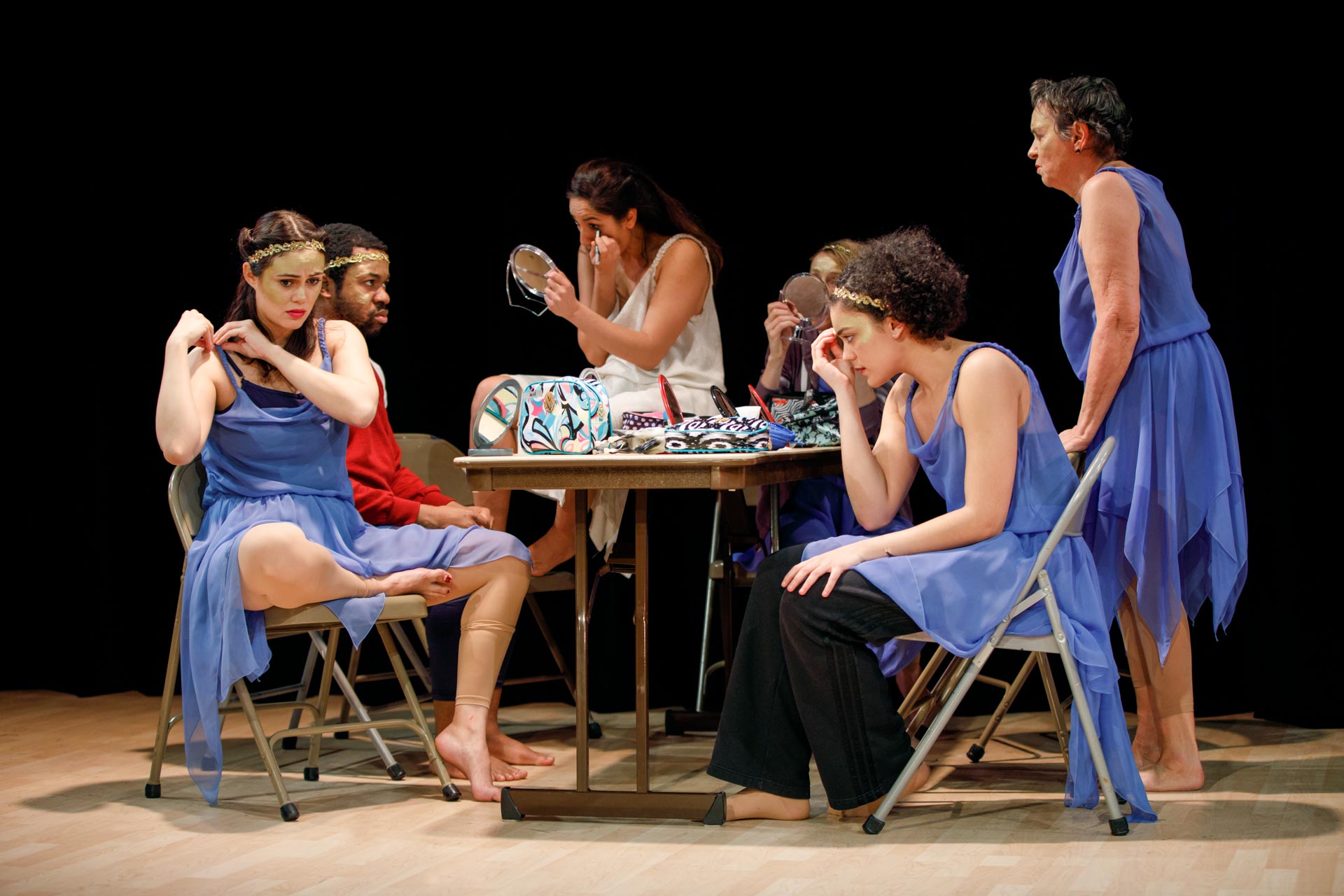If this sounds like a repeat of movies and plays about the rigor and terror of being young in the dance world, it’s no accident; the trope of the domineering instructor and their unflaggingly devoted, self-destructive dance student is an enduring one, immortalized in films like Center Stage and Black Swan.
Only in Barron’s play, this scene is played for laughs, a move that works especially well considering Barron’s cast of “thirteen-year-old” competition dancers is played by a cast of actors whose ages range from their 20s to their 60s. The image of a real adult dancer scurrying off the stage, head bowed, taking up as little space as possible, is hilarious. How did we ever take dance so seriously that we forgot we had agency over our bodies? Have we ever taken anything so seriously since?
How did we ever take dance so seriously that we forgot we had agency over our bodies? Have we ever taken anything so seriously since?
Clare Barron is an insider; she trained in classical ballet until the age of 15, and knows the world in a way a voyeur like Black Swan director Darren Aronofsky never really will. There’s a difference between artists who want to make work about what they believe dance culture to be, and artists who make work about what the dance world actually is. Filmmakers and directors who seek to up the dance world’s “drama” are a dead giveaway for the first kind; in assuming the rarified world of dance is itself not interesting enough to dramatize, these artists miss the joy and weirdness that’s right in front of them.
“Dance Nation” is one of the few examples of this second kind of work, but its ingenuity and wit does not derive from its being a rarity. Instead, Barron’s grasp of the absurdity and self-seriousness of dance team culture is what makes this play so good. After all, Barron helps us realize, what we’re asking dancers to do for us is itself absurd. “I want to feel things with my arms and my legs,” says Zuzu, a member of the dance team played by Eboni Booth, says during her monologue. “I want to make people feel things with my arms and my legs.”
Contemporary competition dance often asks its youngest dancers to take on a Russian novel’s worth of despair and emote it into tangible pathos. The projection of emotion is a technical skill; “faces” are just as important as the form of an arabesque. And when you’re being judged alongside dozens of other studios, the emotional ante keeps going up. “Dance Nation” explores this with tangible glee. Barron’s dancers are tasked with the maudlin assignment of performing a dance about “the spirit of Gandhi,” who the dancers can empathize with because he starved himself. At another point in the play, Zuzu recalls her mother asking her to dance in order to cure her cancer. “It didn’t cure her cancer,” she says, defeated. Worst of all, she didn’t make the audience cry.
The central storyline of “Dance Nation” involves conflict between a preternaturally talented dancer named Amina (on the June 18th performance, played by Layla Khosh) and Zuzu, dancer who loves it but lacks follow-through. This dramatic arc is actually the least interesting part of “Dance Nation,” while also being the most conventional. Though it’s difficult to imagine the narrative structure working out another way, the cast members’ monologues outside of the A-plot proved the most moving and surprising. These monologues capture this age in all its power; of feeling young and cosmic, and like, if you really tried hard enough, you could fly. When Luke (Ikechukwu Ufomadu), the lone male dancer in the cast, talks about the simple routine of his mother driving him home every day from dance class—rain on the car windows, feeling drowsy and exhausted and safe—the boisterous crowd at Playwrights Horizon fell quiet. It’s these normal moments that become magic. After he’s grown up, he’d give anything to have these car rides again.
Some of Barron’s choreographic choices could have used more consistency. At times Barron decided to show some of the dance team’s dances full-out, and some just distilled into their most salient parts. During the audition for the Gandhi piece, for instance, the dancers stand in a chorus line and distort their faces between a set of stock emotions: “Sadness, surprise, fierce; Sadness, surprise, fierce.” Later in the show, the dance team’s competition performance is staged like an actual dance. (Of course, there’s more deliberate posing, formation changes, and meaningful “emoting” than there is actual dance, but it was unclear how much the audience was meant to extrapolate of the dance team’s ability from what dance we were actually seeing).
But none of that distracted from Barron’s sharp, wildly smart writing. Her dialog captures a teenager’s jerky, halting attempts at discovering a self—which, when your whole world is your dance class, means emotional growth must occur within the restrictions of a tiny studio world and strict rehearsal schedule. As Barron understands, these restrictions don’t dull emotions. Instead, they set everything in Technicolor. You never doubt the stage of life that these characters are playing; half gonzo self-confidence and blistering self-doubt. “I think I’m freaking gorgeous,” Ashlee (Lucy Taylor) says. “I wish I could show you my ass but I’m 13.” For the cast of “Dance Nation,” nothing matters more than the dizzying power of being young and convinced that dance can change the world; of taking the stage with your friends and feeling like a god.












comments